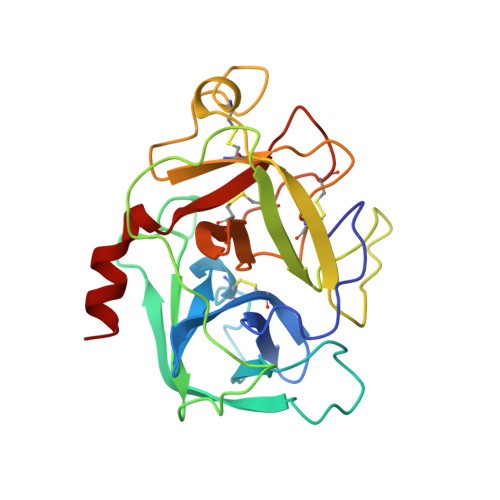GtoPdb is requesting financial support from commercial users. Please see our sustainability page for more information.
Contents:
Gene and Protein Information  |
||||||
| Species | TM | AA | Chromosomal Location | Gene Symbol | Gene Name | Reference |
| Human | - | 253 | 19p13.3 | CFD | complement factor D | |
| Mouse | - | 259 | 10 39.72 cM | Cfd | complement factor D | |
| Rat | - | 263 | 7q11 | Cfd | complement factor D | |
| Gene and Protein Information Comments | ||||||
| Amino acid counts are for the preproproteins. | ||||||
Previous and Unofficial Names  |
| complement factor D (adipsin) |
Database Links  |
|
| Alphafold | P00746 (Hs), P03953 (Mm), P32038 (Rn) |
| ChEMBL Target | CHEMBL2176771 (Hs), CHEMBL4295743 (Rn) |
| Ensembl Gene | ENSG00000197766 (Hs), ENSMUSG00000061780 (Mm), ENSRNOG00000033564 (Rn) |
| Entrez Gene | 1675 (Hs), 11537 (Mm), 54249 (Rn) |
| Human Protein Atlas | ENSG00000197766 (Hs) |
| KEGG Gene | hsa:1675 (Hs), mmu:11537 (Mm), rno:54249 (Rn) |
| OMIM | 134350 (Hs) |
| Pharos | P00746 (Hs) |
| RefSeq Nucleotide | NM_001928 (Hs), NM_013459 (Mm), NM_001077642 (Rn) |
| RefSeq Protein | NP_001919 (Hs), NP_038487 (Mm), NP_001071110 (Rn) |
| UniProtKB | P00746 (Hs), P03953 (Mm), P32038 (Rn) |
| Wikipedia | CFD (Hs) |
Selected 3D Structures  |
|||||||||||

|
|
||||||||||
Download all structure-activity data for this target as a CSV file 
| Inhibitors | |||||||||||||||||||||||||||||||||||||||||||||||||||||||||||||||||||||||||||||||||||||||||||||||||||||||||||||||||||
| Key to terms and symbols | View all chemical structures | Click column headers to sort | |||||||||||||||||||||||||||||||||||||||||||||||||||||||||||||||||||||||||||||||||||||||||||||||||||||||||||||||||
|
|||||||||||||||||||||||||||||||||||||||||||||||||||||||||||||||||||||||||||||||||||||||||||||||||||||||||||||||||||
| Inhibitor Comments | |||||||||||||||||||||||||||||||||||||||||||||||||||||||||||||||||||||||||||||||||||||||||||||||||||||||||||||||||||
| SARS-CoV-2 and COVID-19: Experimental evidence suggests that excessive complement activation may be a driving force behind the diffuse endothelial damage, microvascular/thrombotic/coagulation abnormalties and hyperinflammation in severe COVID-19. The SARS-CoV-2 spike protein is reported to directly activate the alternative complement pathway, by disrupting factor H function at the cell surface [7]. To examine the complement hypothesis, a small molecule factor D inhibitor has been tested in an in vitro model of SARS-CoV-2 infection [7]. The compound of interest is ACH-145951 (Achillion Pharmaceuticals, structure not disclosed), which acts upstream of anti-C5 agents such as eculizumab and ravulizumab, so prevents the accumulation of both C3c and C5b on cells. ACH-145951 was found to block the complement activation that was induced by SARS-CoV-2 spike proteins in the cellular model. | |||||||||||||||||||||||||||||||||||||||||||||||||||||||||||||||||||||||||||||||||||||||||||||||||||||||||||||||||||
| Antibodies | |||||||||||||||||||||||||||||||||||||||||||||||||||
| Key to terms and symbols | Click column headers to sort | ||||||||||||||||||||||||||||||||||||||||||||||||||
|
|||||||||||||||||||||||||||||||||||||||||||||||||||
| Immunopharmacology Comments |
| A protease component of the alternative complement pathway; responsible for cleaving complement factor B. |
Clinically-Relevant Mutations and Pathophysiology 
|
||||||||||||
|
||||||||||||
References
1. Abdel-Magid AF. (2012) Factor D Inhibitors for the Treatment of AMD: Patent Highlight. ACS Med Chem Lett, 3 (10): 781-2. [PMID:24900375]
2. Altmann E, Hommel U, Lorthiois ELJ, Maibaum JK, Ostermann N, Quancard J, Randl SA, Rogel O, Simic O, Vulpetti A. (2012) Indole compounds or analogues thereof useful for the treatment of age-related macular degeneration (AMD). Patent number: WO2012093101. Assignee: Novartis Ag. Priority date: 04/01/2011. Publication date: 12/07/2012.
3. Iyer A, Xu W, Reid RC, Fairlie DP. (2018) Chemical Approaches to Modulating Complement-Mediated Diseases. J Med Chem, 61 (8): 3253-3276. [PMID:28977749]
4. Jing H, Babu YS, Moore D, Kilpatrick JM, Liu XY, Volanakis JE, Narayana SV. (1998) Structures of native and complexed complement factor D: implications of the atypical His57 conformation and self-inhibitory loop in the regulation of specific serine protease activity. J Mol Biol, 282 (5): 1061-81. [PMID:9753554]
5. Lorthiois E, Anderson K, Vulpetti A, Rogel O, Cumin F, Ostermann N, Steinbacher S, Mac Sweeney A, Delgado O, Liao SM et al.. (2017) Discovery of Highly Potent and Selective Small-Molecule Reversible Factor D Inhibitors Demonstrating Alternative Complement Pathway Inhibition in Vivo. J Med Chem, 60 (13): 5717-5735. [PMID:28621538]
6. Loyet KM, Good J, Davancaze T, Sturgeon L, Wang X, Yang J, Le KN, Wong M, Hass PE, Campagne Mv et al.. (2014) Complement inhibition in cynomolgus monkeys by anti-factor d antigen-binding fragment for the treatment of an advanced form of dry age-related macular degeneration. J Pharmacol Exp Ther, 351 (3): 527-37. [PMID:25232192]
7. Yu J, Yuan X, Chen H, Chaturvedi S, Braunstein EM, Brodsky RA. (2020) Direct activation of the alternative complement pathway by SARS-CoV-2 spike proteins is blocked by factor D inhibition. Blood, 136 (18): 2080-2089. [PMID:32877502]
How to cite this page
3.4.21.46 Complement factor D: complement factor D. Last modified on 06/05/2022. Accessed on 31/01/2026. IUPHAR/BPS Guide to PHARMACOLOGY, https://www.guidetoimmunopharmacology.org/GRAC/ObjectDisplayForward?objectId=2842.

 Target has curated data in GtoImmuPdb
Target has curated data in GtoImmuPdb









